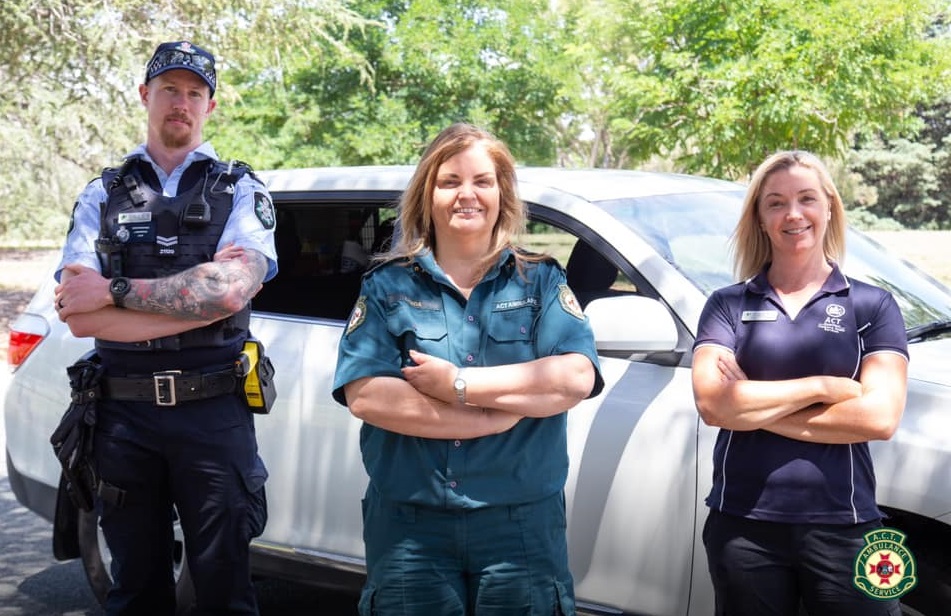
Pacer teams are comprised of a police officer, paramedic and mental health clinician to respond to acute cases. Photo: Facebook / ACT Emergency Services Agency.
Discussions to make the ACT’s acute mental health response team a permanent fixture are underway as clinicians seek more assurance about its future.
The second Police, Ambulance and Clinician Early Response (Pacer) team has been financed until the end of the financial year; however, uncertainty about what’s next is holding up chances to improve.
Teams are made up of a police officer, paramedic and mental health clinician with referrals received from ACT Policing or the ACT Ambulance Service. Since Pacer was established in December 2019, teams have responded to 6510 incidents.
Mental Health Minister Emma Davidson said a recent evaluation had highlighted the service’s benefits and that talks were underway to make it a permanent part of the government’s budget.
“Canberrans deserve access to timely mental health support in their homes and communities so they can live well during their recovery. Emergency departments can often exacerbate someone’s emotional state, whether they are there for mental distress or physical illnesses,” she said.
“We know that our Pacer program is having a demonstrable impact on both individual lives and our emergency systems. It has reduced emergency department presentations, with over 70 per cent of people Pacer respond to receiving the support and care they need outside of the hospital.”
A permanent future is something Canberra Health Services’ mental health, justice health and alcohol and drug services executive director Katie McKenzie would love to see.
She explained Pacer had had a “huge” impact on the health system and was a “critically important” part of Canberra’s mental health care offerings.
“There are times when we do need to respond to the community, and doing that with police and our ambulance partners means that can be done as safely and as effectively as possible, and provide the support that the consumers need at the moment that they need it,” Ms McKenzie said.
She described the evolution of Pacer as a “maturing” journey – now that the multi-agency response had been set up, a full set of services needed to be established to support both agencies and people who needed help outside of a hospital setting.
“I absolutely see the next step in the process is [assessing] what supports are needed outside of the hospital for people who might need more input than what can be given in a Pacer interaction?” Ms McKenzie said.
“I would like to see permanency and stability and clarity for the team that actually allows us then to move clinic space, which then ensures [we can set up] what’s needed in the space – outside of the hospital and emergency department – to support people experiencing mental health issues.”
The Pacer teams respond to about five acute mental health jobs a day. On average, 70 per cent of people are able to avoid hospitals when being connected to care.
Ms Davidson said, along with permanency, she was considering how to better expand the service and make it more effective.
“That might be, for instance, better access to mental health follow-up care after Pacer has seen someone,” she said.
“It might also be having somewhere people can be taken to by Pacer if they don’t need an in-hospital patient stay, but they do need a break from home while they reset. Having a safe place to go can be very effective.”
The role of police in these teams has been questioned as some feel the presence of a uniformed officer can exacerbate a situation.
Ms Davidson said officers were an important part of the team, and those who had taken part were able to take their skills back to community policing.
“There are times when we do need police help, and when we need it, it’s great to know they’re there and they’re able to do what’s needed,” she said.
ACT Policing Acting Commander Matt Heather said the officers’ main role was controlling the situation and ensuring everyone – particularly the patient – was safe.
“Ideally, a person would seek help and get their required clinical support without the involvement of police,” he said.
“[But] I think having the police officers there with responders to make sure everyone is kept safe is really important.”
The dedicated Pacer teams have also freed up police resources to respond to crimes and patrol Canberra’s streets.
The Pacer team cannot be contacted directly, with calls to 000 or 131 444 triaged by the communications centre. Pacer is available from 2 pm to 12 am, seven days a week.





















